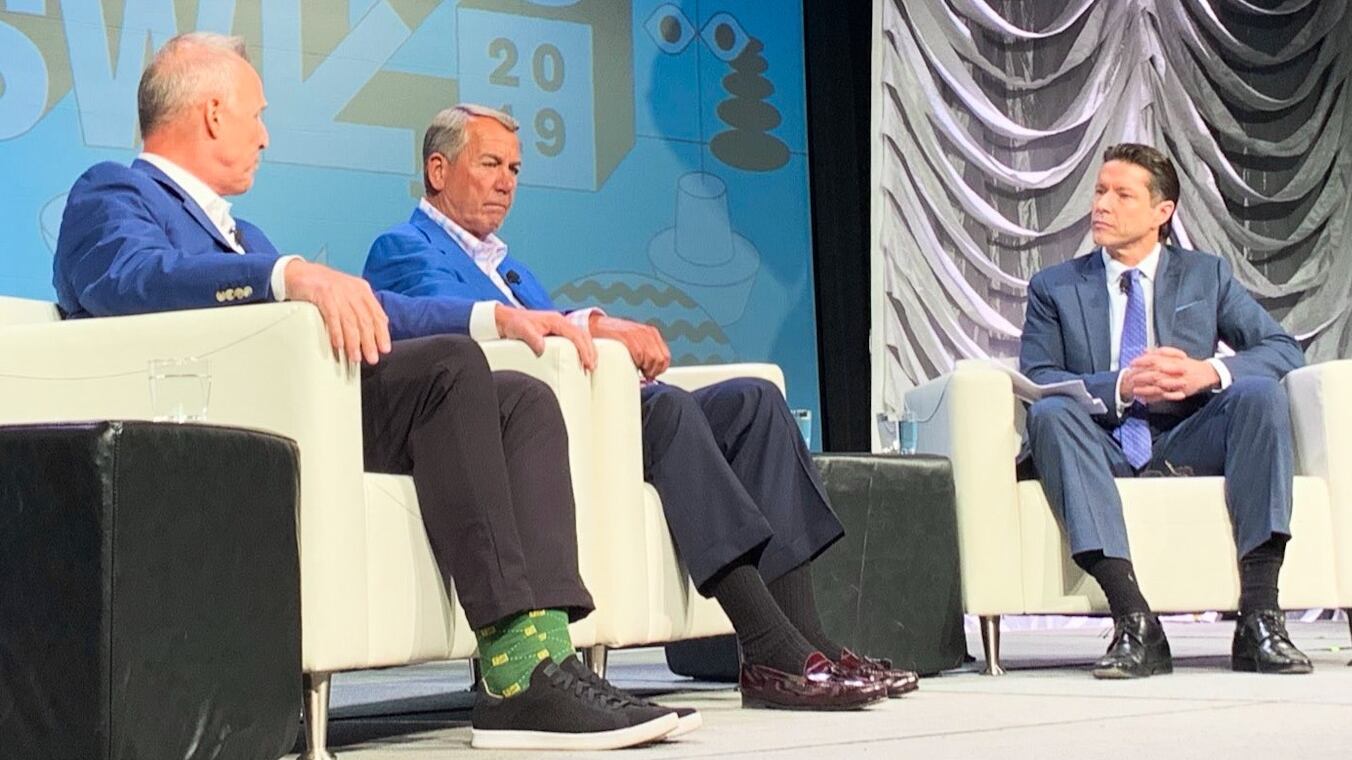AUSTIN, Texas—John Boehner’s bizarre transformation into weed enthusiast/businessman reached its apex on Friday when the former Republican House Speaker spoke at South by Southwest.
CNBC Fast Money regular Tim Seymour moderated the early afternoon conversation between Boehner and Kevin Murphy, the founder and CEO of Acreage Holdings, a Canadian-based marijuana investment firm.
Boehner spent his entire tenure as the most powerful lawmaker in the country being “unalterably opposed” to the decriminalization of marijuana but now runs his own lobbying group that advocates “changing federal law to acknowledge states' rights to regulate and manage cannabis policy.”
If he’s aware of the irony, he’s not letting on.
The talk opened with jokes about Boehner and Murphy’s matching blue blazers, followed by some vague promises from the latter to use his firm’s funds to push for “social justice” and programs for veterans.
Asked about how his conservative record jibes with his newfound stance on marijuana, Boehner said, “I’d really never thought much about it,” but as he began to meet more people who used the drug, he started entertaining the idea of getting involved in the booming industry. He said it was an interaction with a wounded veteran who was helped by medical marijuana that started to sway him in that direction.
“Yes, it was quite a shock to a lot of people,” Boehner said, including his former colleagues in the House. “They all tease me about it, but it doesn’t matter.” He predicted “exponential growth” in the marijuana industry, which may explain his change of heart more than anything else.
“I’ve never used the product,” Boehner, who is known for smoking cigarettes and drinking red wine, said. “Not to say I’ll never use it, but I haven’t used it yet.” He said that if he was convinced that marijuana was better than Advil PM as a sleep aid, he would try it for that.
He said he’s “shocked” at how many people are concerned about how Washington is treating marijuana on a federal level. The fact that 33 states have legalized marijuana, he added, shows that the American people are for it.
“Washington has just been in the way,” he said. “And they need to get the hell out of the way.”
In both 2005 and 2007, Boehner voted against amendments that would have prevented the Department of Justice from going after individuals for using or providing medical marijuana. As recently as 2014, he had the chance to vote for an amendment that prohibits states from penalizing banks for working with marijuana businesses and he declined to cast a vote.
“You’d be shocked at how hard it is to change the law,” Boehner said later, bemoaning the tyranny of the “status quo” without acknowledging the House Speaker’s unique ability to bring legislation to the floor.
“How are we supposed to believe someone whose voting record has been racist, homophobic and misogynistic?” a woman in the audience shouted at one point. Instead of addressing those issues specifically, Boehner touted his own record on criminal justice reform without giving specifics.
“I don’t think we ought to have people in jails and prisons who are not a risk to society,” Boehner said. “And I don’t see these people as a risk to society.”
One of Boehner’s earliest votes in Congress was against a 1993 bill that provided funding for alternative punishments for young people convicted of non-violent crimes.
Asked if he believes marijuana legalization could have passed while he was speaker just a few years ago, Boehner emphatically said no, again citing how much public opinion has changed in that short period. Even as he admitted that traditionally Republicans have been “more opposed” to marijuana than Democrats have, he did not seem to take any responsibility for impeding progress on the issue.
Towards the end of the session, Kevin Murphy heralded Boehner’s “courage to change [his] mind,” comparing the national shift on the issue to same-sex marriage—something else Boehner opposed when he was in office. “We’re not going to rewrite history,” he said, “but we are going to basically create a future where people can receive compassion and care through cannabis, end of story.”
That line got applause from the room. But it was clearly hard for some, both in the crowd and watching online, to forgive him for his past.







